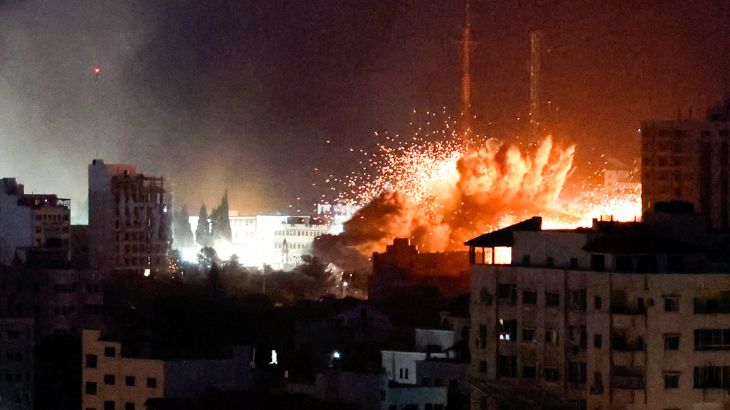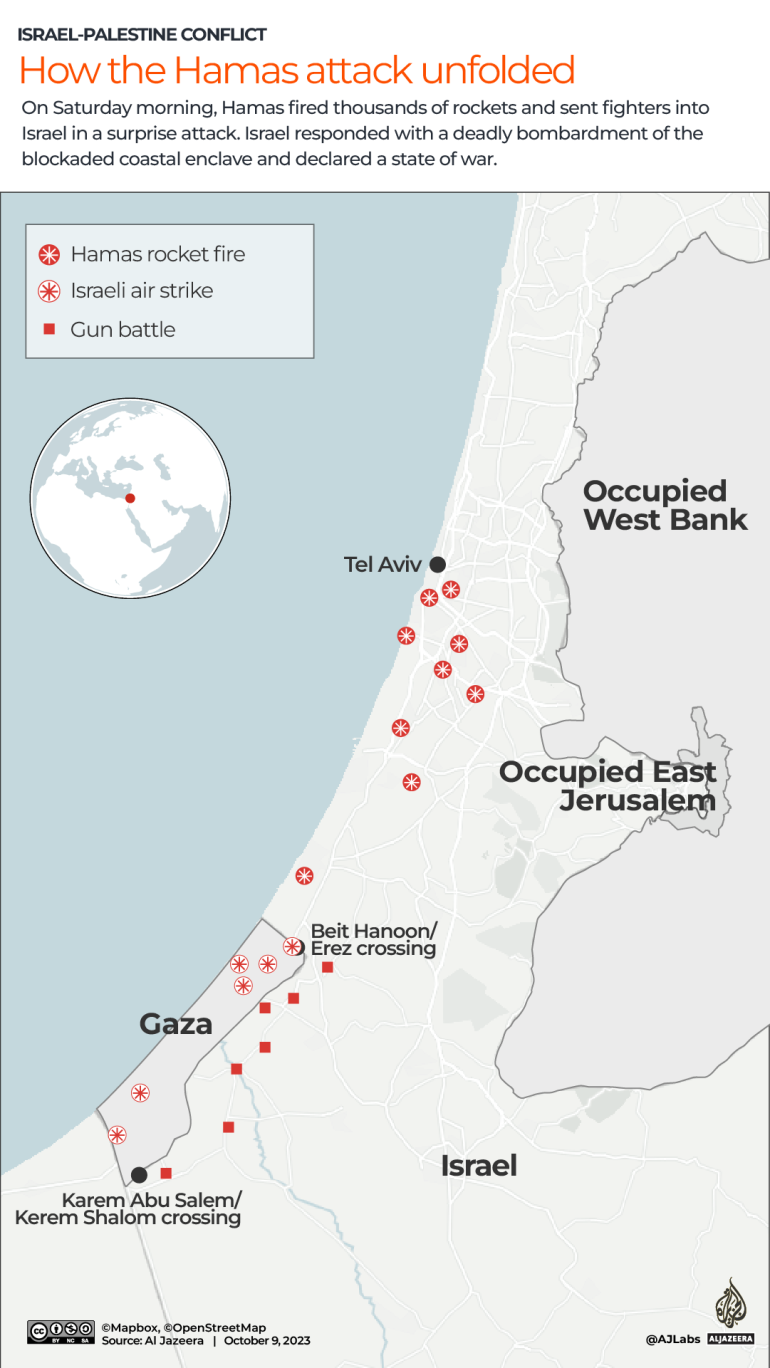What is happening in Israel and Gaza? A look at the war with Hamas
A look at three days of conflict after an offensive was launched from Gaza to Israel.

Israel on Monday threatened to track down and punish Hamas fighters while announcing a “total blockade” of the Gaza Strip following a surprise weekend attack by the armed Palestinian group.
Here is what you need to know about the recent developments:
Keep reading
list of 4 items‘Israel doesn’t care about collateral damage’: Bunker busters used in Gaza
Is ‘total’ Gaza blockade a collective punishment against Palestinians?
Photos: Dozens killed and wounded in Israel air raids on Gaza refugee camps
What happened between Israel and Hamas on Saturday?
About 6:30 am (03:30 GMT), many Israelis woke up to sirens after rockets were fired from the Gaza Strip.
Hamas said it launched 5,000 rockets in an initial barrage. Israel’s military said 2,500 rockets were fired.
The strength, sophistication and timing of the morning attack apparently surprised Israel, which has one of the world’s most high-tech intelligence set-ups. Hamas fighters crossed from the Gaza Strip into southern Israel with motorcycles, pick-up trucks, para-gliders and speed boats and attacked 22 locations.
Hamas military commander Muhammad Deif called the operation Al-Aqsa Storm. Hamas spokesperson Khaled Qadomi told Al Jazeera that the group’s military operation was carried out in response to a spate of provocations by Israeli politicians and settlers at Jerusalem’s Al-Aqsa Mosque, among Islam’s holiest sites, and to decades of violence and discrimination suffered by Palestinians at the hands of Israel.

How did Israel respond?
In response to the attack, Israel launched what it called Operation Swords of Iron, with its jets bombing the Gaza Strip.
“We are at war, and we will win,” Netanyahu said in a televised statement on Saturday. He said the military would use all of its strength to destroy Hamas’s capabilities. But he warned: “This war will take time. It will be difficult.”
“Get out of there now,” he told Gaza Strip residents, who have no way to leave the tiny, overcrowded Mediterranean territory of 2.3 million people, which is blockaded by Israel by air, sea and land.
Air strikes intensified after nightfall, flattening residential buildings in giant explosions, including a 14-storey tower in central Gaza City.
Israel formally declared war on Sunday and on Monday announced that it would stop the supply of electricity, food, fuel and other essential commodities to the Gaza Strip, a decision that under international law amounts to a war crime.
The eruption of violence comes at a time when Israel has been facing the biggest protests in its history against Netanyahu’s proposal to reform the Supreme Court in ways that critics say weakens the institution. He is doing so while he is on trial for corruption.
Israel’s military also faces harsh questions for the country’s worst intelligence failure in 50 years.
What does the declaration of war mean?
Mohammed Jamjoom, Al Jazeera’s correspondent in West Jerusalem, said the Israeli cabinet’s approval of Netanyahu’s declaration of war means “the prime minister and the defence minister can essentially make decisions going forward without having to consult the cabinet when it comes to every specific action.”
“It essentially formalises it, legalises the war going forward,” he said.
The army has called up about 300,000 reservists.
Israel has hit more than 1,000 targets in Gaza as of Monday, its military said.
What is the current situation in Gaza?
Reporting from the Israeli coastal city of Ashdod, about 35km (20 miles) from the border with Gaza, Al Jazeera’s Charles Stratford said the enclave is enduring enormous bombardment by Israeli forces with consecutive air raids.
“It is a massive, constant bombardment,” Stratford said.
He added that there is a huge Israeli military build-up near the border of the Gaza Strip, which “would suggest that there is going to be some sort of ground invasion”.
More than 100,000 Palestinians in Gaza have been displaced and thousands have taken shelter in United Nations schools. Buildings, mosques and offices have been targeted in the Israeli strikes.
Officials in Gaza’s Ministry of Health said hospitals were expected to run out of fuel needed to power lifesaving equipment in two weeks.
How many people have been killed?
As of Monday, 560 Palestinians have been killed in Gaza, according to health officials, and more than 800 Israelis have also been killed, according to Israeli medical services.
![]()
Could a ground offensive follow?
In his declaration of war, Netanyahu told Israelis: “We will bring the fight to them with a might and scale that the enemy has not yet known,” and observers suggest a land invasion by Israel could be imminent.
Al Jazeera’s senior political analyst, Marwan Bishara, warned that the situation between Israel and the Palestinians “is going to get much worse” in the coming days.
Saleh al-Arouri, a Hamas leader, told Al Jazeera the group was ready for “the worst-case scenario”.
“We will continue to fight until we are rewarded with victory, freedom and independence,” he said.
“This is not a [hit-and-run] operation. We started an all-out battle,” he told Al Jazeera.
What has been the international response?
US Defense Secretary Lloyd Austin ordered the Ford Carrier Strike Group – which includes a host of ships and warplanes, including an aircraft carrier – to sail to the eastern Mediterranean to be ready to assist Israel.
The United Nations Security Council held an emergency meeting on Sunday about the situation. It took no immediate action on a US demand that its 15 members condemn the Hamas attack.
China’s ambassador said it was important to come back to a two-state solution, where Israel and an independent Palestine live side by side.
The European Union announced on Monday that it was “immediately” suspending hundreds of millions of euros in aid for Palestinian authorities.
Fighters with Palestinian factions in Lebanon said they are eager to open a second front against Israel if the Shia-backed group Hezbollah leads the charge.
“Wherever [Israel] is ready for [the fight] to happen, it will happen,” said Ahmed Habet, a member of the Palestinian party Fatah in Burj al-Barajneh, a refugee camp in Lebanon’s capital, Beirut.